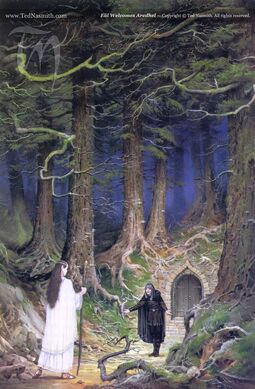Eöl, always called the "Dark Elf", was an Elf of Beleriand and metallurgist of high skill. One of the Sindar, he lived alone in Nan Elmoth, nominally part of Doriath. As a great smith and friend of the Dwarves of Nogrod and Belegost, Eöl devised galvorn, a black metal of great strength and malleability, which he fashioned into personal armor. He forged two great swords from a meteorite's metal: Anglachel and Anguirel.
Biography
Birth
In the Years of the Trees, Eöl was born to a lineage of Avari and Sindar Elves. He became an Elf of amazing skill in smithing, and forged a black, shining metal called galvorn. Of the many swords he had forged, Anguirel was one of the black swords he kept for himself, while the other great sword, Anglachel, was given to Thingol, King of Doriath, in the First Age, for allowing Eöl to dwell in Nan Elmoth.
Eöl forged a suit of armor out of galvorn to which he wore and kept. He lived in Nan Elmoth, a forest in Beleriand to which he appointed himself Lord and built a home there. He forged poisoned javelins and stayed isolated in his land for many years until the arrival of Aredhel.

Aredhel & marriage

Aredhel Ar-Feiniel, the sister of King Turgon, had left the gated and hidden city of Gondolin to seek freedom and find distant family and friends. Her travels led through Beleriand, and to the dark woods of Nan Elmoth, where she met Eöl, who noticed her beauty from afar. He then set enchantments with his Elven magic about her so that she could not escape the forest and found her way only to his halls. After marrying him, she stayed with him many years and bore him a son, Maeglin.
Later life & death
As the First Age progressed, Eöl developed a great hatred for the Ñoldor and therefore refused Aredhel and Maeglin permission to seek out their kin. While Eöl was away at a feast in Nogrod, Aredhel and Maeglin left for Gondolin, stealing Anguirel from him, and Eöl followed them. When denied permission to leave with Maeglin, he grew furious and tried to kill his son with one of his javelins. Aredhel got in the way, and it instead hit her; she died from poisoning.

The king and his people were unwilling to forgive this deed and Eöl was sentenced to death and cast over the Caragdûr, cursing Maeglin on his way down the cliff to his doom. Though most of the Ñoldor saw this as just, Idril was disgusted with Maeglin's act of kinslaying. This drove a rift between Idril and her kin and planted a seed of evil in the heart of Gondolin.[1]
Other versions of the legendarium
In the essay "Quendi and Eldar", published in The War of the Jewels, Eöl was an Avar who descended from the same clan of the Elves the Ñoldor had come from (the Tatyar), although Eöl hated his Valinorean cousins. Eöl's love for smithing and friendliness to the Dwarves is consistent with Tolkien's view of the Ñoldor, which are described as Dwarf-friends in the First and Second Ages. However, in a later writing, entitled Maeglin and published in the same volume, Tolkien said he was of the kin of Thingol. This story was inserted in the published Silmarillion as a separate chapter.==Eöl's family tree==
| Fingolfin |
| Anairë |
|
|
|
|
|
|
|
|
|
| (Unknown Teleri lineage) | ||||||||||||||||||||||||||||||||||||||||||||||||||||||||||||||||||||||||||||
|
|
|
|
|
|
|
|
|
|
|
|
|
|
| ||||||||||||||||||||||||||||||||||||||||||||||||||||||||||||||||||||||||||||
|
|
|
|
|
|
|
|
|
|
|
|
|
|
|
|
|
|
| ||||||||||||||||||||||||||||||||||||||||||||||||||||||||||||||||||||||||
| Fingon |
| Turgon |
| Aredhel |
| Eöl |
| Argon | |||||||||||||||||||||||||||||||||||||||||||||||||||||||||||||||||||||||||||||||||
|
|
|
|
|
|
|
|
|
|
|
|
| ||||||||||||||||||||||||||||||||||||||||||||||||||||||||||||||||||||||||||||||
|
|
|
|
| Idril |
|
|
| Maeglin | |||||||||||||||||||||||||||||||||||||||||||||||||||||||||||||||||||||||||||||||||
Translations
| Foreign Language | Translated name |
| Amharic | ዐኦል |
| Arabic | آيل |
| Armenian | Եոլ |
| Belarusian Cyrillic | Еол |
| Bengali | এওল |
| Bulgarian Cyrillic | Еол |
| Chinese (Simplified) | 伊奧 |
| Georgian | ეოლი |
| Greek | Έολ |
| Gujarati | ઍઓલ |
| Hebrew | אאול |
| Hindi | एओल |
| Japanese | えおl |
| Kazakh Cyrillic | Еөл |
| Korean | 에올 |
| Lao | ເໂຣ |
| Macedonian Cyrillic | Еол |
| Marathi | एओल |
| Mongolian Cyrillic | Еөл |
| Nepalese | एओल |
| Pashto | ېول ? |
| Persian | ائول |
| Ukrainian Cyrillic | Еол |
| Russian | Эол |
| Sanskrit | एओल् |
| Serbian | Еол (Cyrillic) Eol (Latin) |
| Sinhalese | ඒඔල් |
| Tajik Cyrillic | Еол |
| Tamil | ஏஒல் |
| Telugu | ఏఒల |
| Uzbek | Еол (Cyrillic) Eol (Latin) |
| Yiddish | עאָל |
References
- ↑ The Silmarillion, Quenta Silmarillion, Chapter XVI: "Of Maeglin"